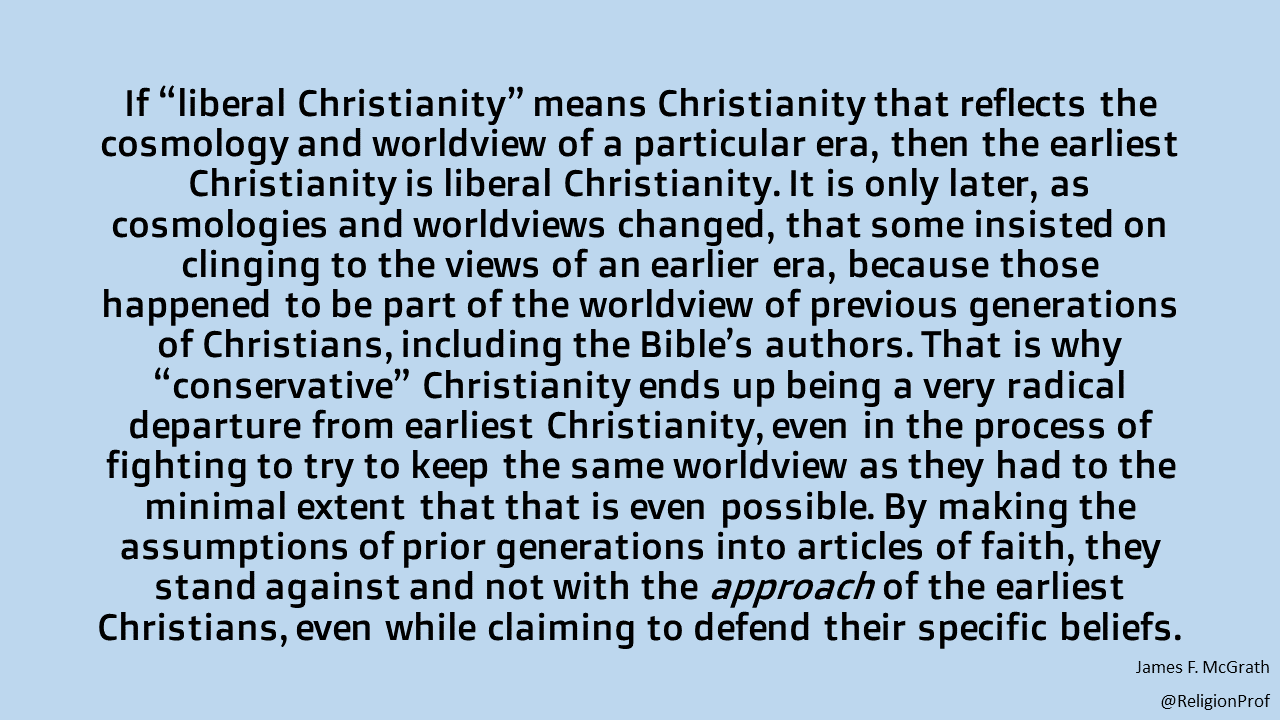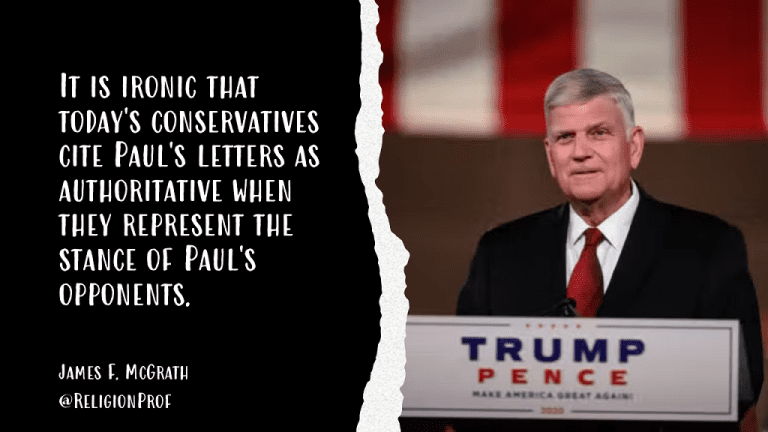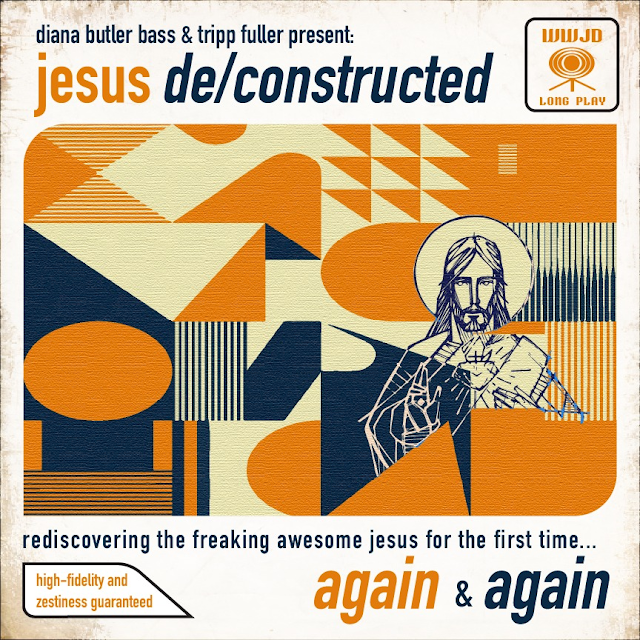Who is the Founder of Progressive Christianity?
by James F. McGrath
July 16, 2022
Rather than give “Jesus” as a one-word answer to the question of who founded progressive Christianity, let me begin with a quote from something I wrote here on my Patheos blog some years ago which makes that same point but in more words and with more detail, which those who are skeptical of my assertion will need if they are to be persuaded:
If “liberal Christianity” means Christianity that reflects the cosmology and worldview of a particular era, then the earliest Christianity is liberal Christianity. It is only later, as cosmologies and worldviews changed, that some insisted on clinging to the views of an earlier era, because those happened to be part of the worldview of previous generations of Christians, including the Bible’s authors. That is why “conservative” Christianity ends up being a very radical departure from earliest Christianity, even in the process of fighting to try to keep the same worldview as they had to the minimal extent that that is even possible. By making the assumptions of prior generations into articles of faith, they stand against and not with the approach of the earliest Christians, even while claiming to defend their specific beliefs.
Let me immediately add that it may not be helpful to speak of Jesus as the “founder” of Christianity, as though he was seeking to start a new world religion. Jesus, like most “founders” of new religions, did not intend to do so but was instead a reformer within his own religion, Judaism. The process of getting from there to here reflects the progressiveness of Jesus that I’ll be seeking to highlight here. My point is that, to the extent that progressive Christianity has a beginning, that beginning is with Jesus and has continued unabated ever since.
---
Everyone is more progressive or liberal than some people and less so than others. Progressive and liberal are tendencies along a spectrum and not absolute binary categories. In the case of Jesus, can anyone really deny that he was open to taking things in a new direction, to innovation and change? He taught his followers to do the same. This doesn’t mean that there weren’t elements in which Jesus was conservative, just as is true of his progressive followers today. Many progressives are also interested in getting back behind developments in doctrine and institutional structures to a simplicity they associate with Jesus and his first disciples. That’s very Protestant, and in one sense is inherently conservative.
Those who are defined as conservatives today often claim to be doing (or at least trying to do) the same thing. But those who are most often labeled conservative are seeking to go back to the supposed original beliefs and practices of Christians and to replicate them irrespective of the changes that have taken place since then and the differences between our own context and that in which Christianity first arose.
Progressives, on the other hand, seek to implement in our time the same openness, the same guiding principles, that Jesus emphasized. Just as he was open to recognizing genuine and even superior faith among those who tended to be defined out of the people of God in his time (Matthew 8:10), today’s progressive Christians seek to do likewise. As Jesus envisaged Gentiles coming to the messianic banquet to dine alongside the Israelite Patriarchs (Matthew 8:11), Paul and others went against the clear teaching of Genesis which required the circumcision of all who were part of Abraham’s household. Instead these Christians insisted (over against the conservative Christians of their own time) that if God had shown that uncircumcised Gentiles are accepted by pouring out the Holy Spirit on them, circumcision must not be essential (Galatians 3:2-5).
As I have said here on my blog before, “Conservative Christians often claim to be the most faithful interpreters of Scripture. But it seems to me that if we have ears to hear what the Spirit was saying to the churches down the ages, it will become clear that focusing on written words and using them to argue against what the Spirit is doing often led people to be on the ‘wrong side’ as far as the Bible’s own perspective is concerned. And part of the message of many parts of the Bible is a warning to learn from such mistakes of the past.” Paul did not feel that pointing out “what the Bible says” settled a matter. Neither did Jesus, who famously said that Moses was the one who permitted divorce in scripture but God’s ideal for human beings was lifelong fidelity (Matthew 19:8).
---
Those who wrote the Gospels in Greek were likewise progressive inasmuch as they cared less about preserving the exact words of Jesus in his native tongue Aramaic, than they did about communicating the core of his message as they understood it to as wide an audience as possible, which meant writing in Greek, the lingua franca of the Eastern Roman Empire.
Early Christian apologists like Justin Martyr (the original “apologists” before modern internet debaters sullied the term) stood in this tradition as well, being open to Greek and Roman philosophies and the insights they offered. All through the ages there have been those who have stood in this tradition, and so in that sense there is an unbroken lineage of progressive Christianity that connects Jesus to the present day.
Liberal Protestants closer to our time - such as Martin Luther King Jr. - must also be included. Many conservatives embrace his emphasis on racial equality, completely unaware that he represents a liberal Baptist position. If one reads his essay on the topic of the divinity, virgin birth, and resurrection of Jesus that he wrote while a student at Crozer Theological Seminary, one will find things that reflect the stance of today’s liberal and progressive Christians.
---
Having put matters in those terms let me now pose an important question: Why Switch to Progressive?
I realize that sounds like a slogan in a car insurance ad but that’s not what I mean here, as is hopefully clear from the context.
In the first instance the question is about the terminology (which I confess I don’t find all that helpful). Why do people tend to identify as “progressive” Christians nowadays when a generation ago they tended to use the label “liberal”?
Progressive doesn’t have a meaning that is clearly distinct from liberal. Moreover, some progressive, or liberal Christians, are theologically conservative but politically liberal, while others are the exact reverse. There’s potential for misunderstanding, to say the least. However, because liberalism reflected a stance that was very modern and shaped by the values of the Enlightenment (just as fundamentalism is shaped by that same context as the flip side of liberalism and a reaction against it), those who have accepted postmodern critiques of liberalism tend to prefer the term “progressive.”
Yet the same openness to new insights (whether from biblical study, history, science, psychology, or anywhere else) characterize the two. Progressive Christianity thus reflects the present-day iteration of a liberal/progressive approach to God, faith, and other human beings that we can trace back as far as the very beginnings of Christianity, to Jesus himself.
---
Hopefully the above makes clear another sense in which I want to answer the question, “Why switch to Progressive?”
Why do I think others should embrace progressive Christianity? Because it reflects the outlook of Jesus and his earliest followers.
Christianity has always been bridging gaps, including outsiders, challenging assumptions, and innovating new beliefs and structures.
Some deny that, and so, rather than speak about progressive Christianity, I’d much rather talk simply about Christianity, or about honest Christianity, one that doesn’t pretend that there is no picking and choosing going on, just a preservation of a faith in static stagnant sameness.
[But], that has never been the case.
The key difference between progressive Christians and conservatives is that progressives acknowledge the fact that we preserve things selectively, that we pick and choose, and that we never fail to experience change. We do not view this process negatively the way conservatives do, even though they participate in the same processes, however much they might try to deny this is so.
That’s the answer in a nutshell.
It could have been briefer, as I indicated at the outset. I could have said “Jesus is the founder of progressive Christianity” and left it at that. But many people today treat conservative forms of Christianity as the default, as though they genuinely represent the classic historic Christian faith. In actual fact they merely preserve a dogmatic rejection of change that arose in that specific form relatively recently in history.
There were conservatives among the earliest Christians, and we read about them because they did things like opposing Paul’s proclamation to Gentiles of a gospel that did not require circumcision. It is ironic that today’s conservatives cite Paul’s letters as authoritative when they represent the stance of Paul’s opponents.
TL; DR: The core of Christianity was progressive from its beginning, and today’s progressives continue that tradition.
Also related to this topic:
Finally, a couple of memes you can share:























